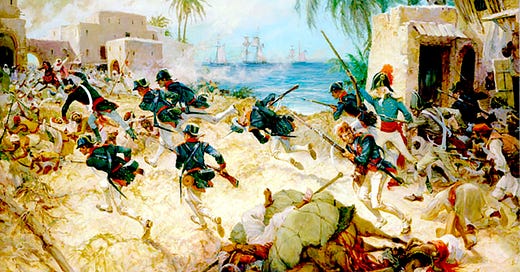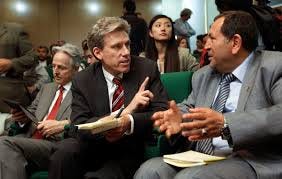Two Hundred Years. Two Attempted Regime Changes. Two Genuine American Heroes.
Part 3 of 4: The Legacy of William Eaton
“Attack on Derna", Charles Waterhouse, USMC
In the last segment, I described being sent in 2004 to confirm the location of the"Protestant cemetery" in Tripoli, Libya, and the remains of 13 American sailors who lost their lives on the USS Intrepid two hundred years before. The Intrepid blew up prematurely in Tripoli harbor in 1805 as the crew tried to position her to destroy a pirate fleet. As I stood on that hill, sketching monuments to America’s early history, I was unaware that I was walking into a new chapter of a story that already stretched across two centuries and more than 5000 miles.
A few months after that excursion, Christopher Stevens, a more senior department colleague, called to sound me out about my Libya assignment. We had been introduced by former Assistant Secretary Richard Murphy a few months before.
"I'm thinking of bidding on the #2 post in Tripoli," Stevens said. “Can you tell me what you do all day long?” He seemed to be only partly joking. The Department was saturated with stories of the abysmal morale at the US mission. I was sure one of the reasons he wanted to speak with me was to get a sense of how bad conditions were. Instead of focusing on the chaos, I gave him my perspective, as one of the few in the American mission whose job was to go out and talk to Libyans.
I described the thrill of being one of the first to return to a country that had been off the American diplomatic map for more than 20 years, following the burning and looting of the US embassy in 1979, and the explosion of Pan Am 103 over Lockerbie Scotland nine years later, which killed 270 — mostly Americans. Gaddafi’s role in these, and many other acts of terror initiated years of punishing sanctions against Libya.
I mentioned to Chris my outing to the hillside to track down the Protestant cemetery and the fallen from 1805. Chris was more than passingly familiar with the Barbary Wars, having been involved with preserving related historical documents while a Peace Corps volunteer in Morocco, years before. The Barbary Wars constituted America' first overseas war, albeit undeclared; and they would set precedents – not all positive -- for American foreign policy in the decades and centuries to come.
From Chris’ murmurs of approval, I sensed he was confirming what he believed to be true – not about morale, but that Libya seemed to offer many possibilities for someone with a deep interest in the region, its politics, language and culture.
But would the rushed 2003 American rapprochement with Libya’s volatile dictator Muammar Gaddafi ultimately lead to revolution? This was a question on the minds of many of the foreign diplomats posted to Libya at the time. None could have predicted the answer would come so soon.
***
Eaton's unprecedented march on the coastal town of Derna created leverage that might have ended Karamanli's attacks on American shipping in the Mediterranean and freed the 300-odd American hostages — the crew of the USS Philadelphia, which ran into an uncharted reef off Tripoli in 1803 while trying to pen Karamanli's fleet within the harbor. But the fledgling State Department stopped just short of regime change, preferring to bank a settlement than face the possibility of a miscalculation.
Conversely, in 2011, the United States government did overthrow a leader of the area that is present-day Libya, when the Americans– and the Libyans – probably would have been much better off had it not. The US, as would become clear, had not learned the fundamental lesson of Iraq, and had no plan for ‘what came next’. Libya’s subsequent death-spiral would not only make the United States look weak, it would accelerate a growing obsession with risk aversion in the context of the Arab Spring (with direct impact on Syria and Yemen, among other regional policies), would encourage isolationism, and populism — all of which were part of the escalator that created the political predicament the United States faces today.
In several books written about the Arab Spring, Gaddafi was styled as a modern-day Yusuf Karamanli. The two were “master terrorists” who perpetrated heinous attacks on Americans on the high sea, in the air, and on land. The initial US-NATO strikes to defend Benghazi from Gaddafi’s forces effectively split Libya, with Gaddafi in the West and the transitional government in Benghazi.
Ambassador Christopher Stevens (left, Essam Al Fitouri)
Christopher Stevens was appointed US Envoy to rebel government, joining the ranks of diplomats from other nationalities who had recognized the new Libyan government the East He sailed from Valetta, Malta, to Benghazi by cargo ship with a small group of DS (Diplomatic Security) agents and a deputy. Flash back to 1804, when Eaton also sailed from Valetta — not to Benghazi, but to Cairo — in support of a very similar mission.
Stevens’ Arrival in Benghazi — à la Eaton
In late March of 2011, Stevens arrived in Benghazi port, whence he joined other allied diplomats on higher ground at the capital of the Eastern region, Al Bieda, about 100 miles into the interior Jebel, or Green Mountains, to await the green light to re-enter Benghazi.
It was there, in Al Beida, that he met up with Guido De Sanctis, then the Italian Consul General in Benghazi – someone I knew from my own first tour.
As De Sanctis would tell me a years later:
I met Chris Stevens not many hours after his arrival in Benghazi in April 2011. We had spent ten days in Bieda, waiting for Benghazi to be safe. In the meanwhile, the British also disembarked in Derna and between March 28 and April 2 all the main delegations were back in Benghazi. The US team decided to stay in the same hotel we and many others were, the soviet-style Tibesti. Chris and I did not cross in Tripoli, but we knew a lot of people in common and I started by asking him if he felt like the American Consul William Eaton marching on Derna in 1805. He laughed at that, and in our subsequent meetings we always mixed professional talk with more humorous observations
Leave it to an Italian diplomat to speak out loud what Stevens may have preferred to keep to himself. But then, the Italians always knew more about Libya than most Americans. Libya was, after all, their southern neighbor, and once what Mussolini called, the Quarta Sponda, or Fourth Shore.
***
Chris Stevens, after finishing his tour as Envoy, was nominated to be US ambassador to ‘post-Gaddafi’ Libya. He and I would meet in a café in Washington in early Spring, 2012, as he was awaiting Senate confirmation. We shared our mutual fears that Benghazi would implode in short order, and there might be nothing that could be done to prevent it. Stevens hadn't been back to Benghazi since his last day as Envoy nearly six months before. I had been there several times in the intervening months.
“It is very hard,” he said, “to get anyone higher up to focus on Libya.”
When I returned to Benghazi in September of 2012, I was surprised to find now-Ambassador Stevens in Benghazi. Chris invited me to the US mission compound the following evening, "We're under lockdown as a precaution for the 9/11 anniversary” he said. “I can’t leave — but come join us for dinner.”
On behalf of myself and my colleague, and broader team, I declined, and with words that I would be unable to shake for some time:
“Chris — you have security, we don't.”
I had long since learned, from experience on both sides, that those visiting US diplomats often called far more attention to themselves than to the diplomats themselves.
Chris and I agreed to meet the following morning at the Benghazi Medical Center.
Chris was killed that night in an Al Qaeda proxy attack on the mission, along with three other Americans – further entwining his own legacy with that of William Eaton — although the (appropriate) comparison, was never made in the media that surrounded the attack — largely because the Americans had, once again, forgotten the history. I wrote this NYT Op Ed hours after the attack, on the last commercial plane out of Benghazi, both as a tribute to Chris, and a plea for the US not to abandon the city, which I knew would inevitably would lead to a withdrawal from Libya and an extremist takeover.
Eaton did not die in Tripoli — but by his own account, he wished he had. He drank himself to death in a sleepy town in Massachusetts, forever plauged by ‘what might have been.’
Two centuries apart, these American emissaries to Libya became entangled in the complicated dance between American idealism and the messy realities of intervention. Their stories reveal an uncomfortable truth about our nation's approach to foreign policy: we are quick to project our power abroad but often unprepared for the consequences.
The Middle East-Told Slant offers a non-partisan, practitioner's perspective on Middle East politics, conflict, and culture. Written by a former US diplomat, Senior Middle East Analyst, and author of "Benghazi: A New History" (Hachette, 2022) and the forthcoming "Red Sea: A History of the World's Most Volatile Waterway." To receive weekly posts and support this project, consider becoming a free or paid subscriber. I offer paid subscribers a complimentary copy of any of my books in print (equivalent to the cost of the subscription — DM me to redeem).






The two stories really do sit side-by-side in a quite unsettling way don't they Ethan. Thanks for joining the dots for us (again!)